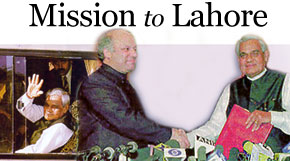The Rediff Special/George Iype

I bring the prayers and goodwill of my fellow countrymen. Let us put aside the bitterness of the past and make a new beginning together."
That was Prime Minister Atal Bihari Vajpayee in 1999.
"The ice has been broken between the countries. Our dialogue will strengthen peace and prosperity in South Asia."
And that was Nawaz Sharief, Vajpayee's counterpart then.
Crowds cheered when the two leaders made these statements. The military on both sides of the border played their national respective songs. All around me, there were sounds of joy and jubilation.
It was a little past 1600 hours IST. As Vajpayee stepped out of the Delhi-Lahore bus, which had Sada-e-Sarhad inscribed on it, to embrace Sharief at the Wagah border on February 20, 1999, both leaders described it as a defining moment in the history of South Asia.
Was it?
It certainly was a moment that defined the history of India and Pakistan.
The hysteria I witnessed on the border, the excitement I saw on the 35-kilometre road from Wagah to Lahore, the animated greetings the social and cultural leaders of both countries exchanged, the Lahore Declaration itself -- all seemed signs of history being made.
But sadly, not many sensed then that "the defining moment in the history of South Asia" was not what it seemed.
The day Vajpayee crossed the Wagah border two incidents took place. One, 20 Hindu villagers were gunned down by terrorists in three separate incidents in Jammu and Kashmir. Two, as Sharief rolled out the red carpet for Vajpayee, the Pakistani military establishment led by General Pervez Musharraf refused to participate in the historic ceremony at the border.
Pakistan's newspapers said the reason behind the boycott was that the service chiefs had 'serious differences' with Sharief's decision to welcome the Indian prime minister so enthusiastically. And so, they chose to attend a banquet hosted by then Pakistan foreign minister Sartaj Aziz to honour Chinese defence minister Chi Haotian.
In hindsight, the two incidents signalled the bus diplomacy would fail. And the events that followed -- the Kargil war, mid-term elections in India and coup in Pakistan -- proved so.
Look at the historic declaration that promised to usher in peace. The memorandum of understanding the two leaders signed dwelt mostly on nuclear and security matters. But were the measures outlined in the MoU implemented? Not at all.
The MoU pledged that both sides would engage in a series of bilateral talks to develop confidence-building measures. No dialogue ensued. Instead, what followed three months later was the Kargil conflict.
Vajpayee then invited Sharief to India. And said while the latter is in this country, a series of bilateral agreements on contentious issues could be inked.
That too never happened. Instead, Sharief found himself in jail and exiled subsequently.
The euphoria that followed Vajpayee's Lahore mission has died down. But the trip is still fresh in my mind: the Wagah border bedecked in pomp and splendour, the three-metre wide no man's land, the competitive celebrations by the Border Security Force and Pakistan Rangers, Vajpayee's joy ride though the 16th century Lahore Fort built by Mughal emperor Akbar... everything.
Twenty-two eminent Indians accompanied Vajpayee on that journey. Not one among them, I am sure, must have dreamt that the trip's spirit would be so short-lived.
But certainly, there had been one positive outcome: the Delhi-Lahore bus service, which continues to ply even today.
Part 1: Trouble in Tashkent
Part 2: The errors of Simla
Part 3: When Rajiv met Zia
The Rediff Specials